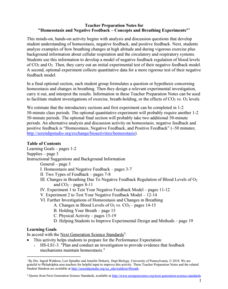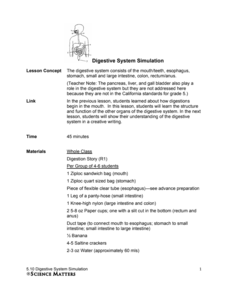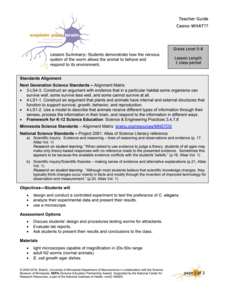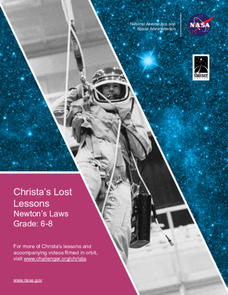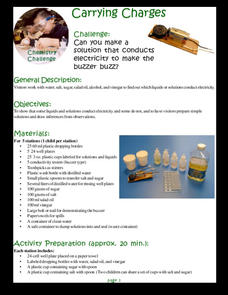Kenan Fellows
Making Connections with Water Quality
What's in your water? And, why is water quality so important? Enhance your class's level of water appreciation through a lesson that demonstrates the necessity of water quality. Environmental enthusiasts explore the EPA's Clean Water...
Community Resources for Science
Spring Mechanics
Scholars practice calculating spring constants before performing hands-on experiments. They compare data for parallel and series springs. Finally, they learn how spring mechanics find applications in biotechnology, such as prosthetic limbs.
Serendip
Homeostasis and Negative Feedback – Concepts and Breathing Experiments
More asthma attacks happen at higher altitudes, but why? Scholars complete worksheets, learning about homeostasis and feedback related to breathing. Then, they work in small groups to experiment with breathing in limited amounts of...
Purdue University
Design of a Green Roof
Help scholars develop a green thumb by building a green roof. Groups first grow lettuce seeds under normal conditions, then they try to grow the seeds in trays that are slanted by 45 degrees. They learn about tropism and engineering...
Science Matters
Photosynthesis-Cellular Respiration Cycle
The balance of nature can be a wondrous thing! With the 19th lesson plan of the 21-part series on systems, learners explore the cycle of photosynthesis and cellular respiration using a lab-based activity. Groups set up different test...
Science Matters
Digestive System Simulation
What do a sandwich bag and a mouth have in common? Your classes are about to find out in a hands-on lesson plan that has groups build models of the digestive system. Using a little imagination, learners use everyday materials to create a...
Science Matters
Digestion: Chew on That
When your mom tells you to chew your food, you really should listen! A instructional activity on the digestive system examines the first step of digestion that happens in the mouth. Learners check crackers and use iodine to highlight...
Purdue University
Light – Just Right!
What does it mean to be resistant to electricity? Scholars answer the question in a six-part STEM activity on electricity. They begin by assessing the conductivity of several different materials and progress to designing their own...
University of Minnesota
Caeno-WHAT??
Can you feel that? Can you smell that? Since pupils can't ask worms about their sense of smell and touch, they design and complete an experiment to answer these questions. Individuals expose nematodes to different stimuli using their...
Purdue University
Can You Design a Hot or Cold Pack?
You're getting warmer. Groups conduct an experiment to determine which of four chemicals are in hot/cold packs. They learn about exothermic and endothermic reactions and use this knowledge to design a hot/cold pack that is small enough...
Purdue University
Bottle Racers
Bottle up pupils' energy to complete a great resource. Scholars design toy cars out of plastic water bottles. They consider different sources of energy to power the cars, such as rubber bands, balloons, and chemical reactions.
Purdue University
Recycling Paper
Build an appreciation for the green movement by recycling your own paper! Learners participate in a STEM instructional activity by learning about the process of recycling paper and then designing their own models. Their ultimate task is...
NASA
Christa's Lost Lesson: Effervescence
How are chemical reactions affected by gravity? Learners explore the phenomenon of effervescence as part of the Christa's Lost Lessons series. They compare findings in an experiment on effervescence to a video of a similar experiment in...
NASA
Christa's Lost Lesson: Newton’s Laws
How do the laws of motion work in space? Learners explore Newton's laws of motion in different experiments as part of the Christa's Lost Lessons series. They rotate around the room in three stations to experience each law in action using...
Hazardous Waste Management Program
Molar Mass Determination from Freezing Point Depression
Let the data tell the story. A lab activity has pupils collect temperature data on solutes as they melt and freeze. They use their data to create a cooling curve and then calculate the molar mass using the freezing point depression.
National Wildlife Federation
Soil Decomposers
The class studies the soil food web that includes earthworms and conduct four experiments using the crawly critters. Individuals determine whether earthworms are sensitive to light, touch, temperature, and acid.
Alabama Wildlife Federation
Leaf Chromatography
Pigmentation of leaves is important in plant processes. Scholars use chromatography to create a better picture of the pigmentation in an assortment of leaves. They share their results to make comparisons between different plant species.
Alabama Wildlife Federation
Itsy Bitsy Spider
Bring the outside in to make observations in a controlled environment. Pupils learn about predator-prey relationships with spiders firsthand. They first construct a spider habitat and then feed the spider insects to make observations...
Sciencenter
Carrying Charges
What's all the buzz about electricity? Scholars take part in a scientific activity to test the conductivity of liquids and solutions. They first see if water, salad oil, alcohol, and vinegar cause a buzzer to buzz when electrodes are...
NASA
Natural Resources on Earth
Natural resources do not always occur so naturally. Lead classes through a thorough set of lessons investigating the natural resources important for plants. Learners complete a series of worksheets as they explore the information and...
National Wildlife Federation
Understanding and Measuring School Electronics
Feel the power in turning off electronics. Using energy-monitoring devices, pupils find the amount of energy it takes to power a simple electronic when it is on and when it is off. They then calculate the cost for the entire year for the...
Bonneville
Titanium Dioxide Solar Cell Construction and Testing
There's raspberry juice in solar cells!? Scholars create and test a titanium dioxide raspberry solar cell in the seventh of 14 lessons in the Cost Effective Solar Cells unit. They coat glass slides with titanium dioxide to make their...
University of Southern California
Wave Erosion Lab
Using a stream table, erosion enthusiasts examine how the density of sediment and how the slope of land contribute to the amount moved by waves. You will not be able to use this entire resource as is; there are teachers' names and...
Curated OER
Ghost Crystals - Light & Water
Woo, ghost crystals, just in time for Halloween! Young scientists experiment with light and water as they make and observe ghost crystals. The lesson does not include the process for making the crystals, but provides a web link where a...
Other popular searches
- Earth Science
- Physical Science
- Life Science
- Science Project
- Science Space
- Environment Science
- History of Science
- Environmental Science
- Pe Science
- Family and Consumer Science
- Consumer Science
- Social Science




